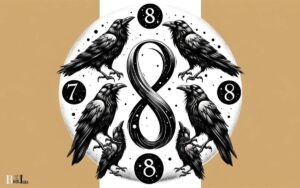What Can I Feed an Injured Crow: Protein Sources, Grains!
To support an injured crow’s recovery, offer a variety of foods such as dog or cat kibble, unsalted peanuts, hard-boiled eggs, and mealworms.
Ensure fresh water is always available. Avoid toxic foods like avocado, chocolate, and caffeine. Consult a wildlife rehabilitator or veterinarian for specific dietary advice.
Feeding an injured crow involves:
- Protein Sources: High-protein foods such as dog or cat kibble, cooked unsalted chicken, or hard-boiled eggs provide essential amino acids.
- Insects: Mealworms and crickets mimic their natural diet and are good for their health.
- Grains and Seeds: Small amounts of grains like corn or wheat can be offered.
- Fruits and Vegetables: Pieces of apple or pear and chopped greens can be included, but moderation is key to avoid diarrhea.
- Hydration: Fresh water must be accessible at all times.
- Foods to Avoid: Never feed crows avocado, chocolate, caffeine, alcohol, or salty foods, which are toxic or harmful to birds.
When aiding an injured crow, it’s important to mimic their natural foraging diet while ensuring the food is safe and nutritious to facilitate their healing journey.

Key Takeaway
Understanding the Dietary Needs of Injured Crows
The dietary needs of injured crows can be complex and specific to their physiological and nutritional requirements.
Crows are omnivorous birds with a diverse diet in their natural habitat, including insects, fruits, grains, and small vertebrates.
When they are injured, their dietary needs may change due to altered metabolic processes and reduced physical activity.
It is crucial to provide a balanced diet that meets their energy and nutrient requirements for recovery.
High-quality bird feed that includes a variety of seeds, nuts, and dried fruits can be suitable for injured crows.
Offering sources of animal protein such as mealworms or lean meat can aid in their healing process. Ensuring access to clean water is also essential for hydration and overall health.
Understanding the specific dietary needs of injured crows is fundamental in promoting their rehabilitation and eventual release back into the wild.
Nutritious Options for Injured Crow Recovery
When considering nutritious options for the recovery of an injured crow, it is crucial to focus on meeting its specific dietary needs.
Providing the right balance of nutrients and ensuring safe feeding practices are essential for the bird’s rehabilitation.
Dietary Needs for Recovery
An injured crow requires a high-protein diet to support its recovery. This is essential for tissue repair and overall healing.
To aid in the recovery process, consider the following nutritious options:
- Lean Meats: Offer cooked chicken or turkey as a source of lean protein.
- Eggs: Provide hard-boiled or scrambled eggs for a high-protein meal.
- Insects: Include live or dried mealworms and crickets to fulfill the crow’s natural diet and protein requirements.
These options will help ensure that the injured crow receives the necessary nutrients to support its recovery and regain strength.
Remember to consult a wildlife rehabilitator for specific dietary recommendations and guidance.
Safe Feeding Practices
To ensure the safe and effective recovery of an injured crow, it is important to continue providing a high-protein diet while adhering to safe feeding practices.
- When offering food to an injured crow, it is crucial to avoid using fishing hooks, sharp objects, or any food that may cause harm.
- Opt for nutritious options such as lean meat, scrambled eggs, or cat or dog kibble.
- It’s important to remember that crows are omnivorous and have a varied diet, so offering a mix of protein sources and some fruits and vegetables is beneficial.
- Provide clean water in a shallow dish to prevent dehydration.
- It’s essential to monitor the crow’s food intake and remove any uneaten food promptly to prevent attracting unwanted pests.
By following these safe feeding practices, you can support the crow’s recovery while ensuring its safety.
Foods to Avoid Feeding an Injured Crow
When caring for an injured crow, it is crucial to be mindful of the foods that should be avoided.
Certain human foods, such as chocolate, caffeine, and alcohol, are toxic to crows and should never be offered to them. Feeding crows fatty or salty foods can be harmful to their digestion and overall health.
Toxic Human Foods
Crow rehabilitators should frequently remind themselves of the toxic human foods that must be avoided when feeding an injured crow.
Certain human foods can be toxic to crows and should be strictly avoided to prevent further harm to the injured bird.
It’s important to remember that even a small amount of these foods can have detrimental effects on the crow’s health and well-being.
The following toxic human foods should never be given to an injured crow:
- Chocolate: Contains theobromine, which is toxic to crows
- Avocado: Contains persin, which can be harmful to crows.
- Alcohol: Can cause severe health issues and should never be given to crows.
Harmful to Digestion
Rehabilitators must be cautious of foods that can be harmful to digestion when feeding an injured crow, continuing the effort to ensure the bird’s safe and effective recovery.
Certain foods, such as bread, dairy products, and processed foods, should be avoided as they can disrupt the crow’s digestion.
Bread, in particular, offers little nutritional value and can lead to malnutrition and digestive issues in crows.
Dairy products, including milk and cheese, are challenging for crows to digest due to lactose intolerance.
Processed foods high in salt, sugar, and artificial additives can be detrimental to the crow’s digestive system.
It is crucial to prioritize easily digestible and nutritious foods, such as fruits, vegetables, and lean proteins, to support the crow’s recovery without causing further digestive distress.
Hydration and Fluid Intake for Injured Crows
An injured crow requires a consistent intake of clean water to maintain hydration and support its recovery.
It is vital to ensure that the crow has access to fresh water at all times, as dehydration can significantly hinder the healing process.
To effectively manage the hydration and fluid intake for an injured crow, consider the following:
- Provide fresh water daily: Ensure that the water provided is clean and free from contaminants to prevent further health complications.
- Monitor water intake: Keep track of the crow’s water consumption to ensure it is staying adequately hydrated during the recovery process.
- Offer electrolyte solutions: In some cases, providing electrolyte solutions can help replenish essential minerals and support the crow’s overall hydration levels.
Offering Protein-Rich Foods for Crow Rehabilitation
Offering protein-rich foods is essential for the rehabilitation of an injured crow. Protein aids in muscle repair and overall health, making it crucial for the recovery of the crow.
Here is a table depicting some protein-rich foods suitable for crow rehabilitation:
| Protein-Rich Foods | Protein Content | Notes |
|---|---|---|
| Cooked Meat | High | Ensure it is boneless and unseasoned. |
| Boiled Eggs | High | Chop into small pieces for easy consumption. |
| Mealworms | High | Can be live or dried. Ensure they are from a reliable source. |
These protein-rich foods should be offered in moderation and alongside a balanced diet to support the crow’s recovery effectively. Always consult a wildlife rehabilitator for specific dietary recommendations.
Providing Essential Vitamins and Minerals for Crow Healing
One should ensure that the injured crow’s diet includes essential vitamins and minerals to support its healing process. Providing the necessary nutrients can aid in the crow’s recovery and overall well-being.
To ensure the crow receives these essential vitamins and minerals, consider incorporating the following into its diet:
- Vitamin C: This vitamin is essential for tissue repair and immune function, helping the crow fight off infections and heal more effectively.
- Vitamin D: Important for bone health and immune function, vitamin D can support the crow’s overall healing process.
- Calcium: Necessary for bone and feather health, ensuring the crow can recover and eventually return to its natural habitat.
Special Considerations for Feeding Injured Crows
When tending to an injured crow’s diet, it is essential to consider any special dietary requirements for its optimal recovery.
Crows have specific dietary needs, and when injured, these needs become even more critical.
- Special considerations for feeding injured crows include ensuring that the food provided is easily digestible and does not pose a choking hazard.
- It’s important to monitor the crow’s food intake to ensure it is receiving the necessary nutrients for healing. Avoid feeding the crow any food that may aggravate its condition or cause further harm.
- Furthermore, providing a stress-free environment while feeding the injured crow is crucial for its recovery.
- It’s important to offer the food in a quiet and calm setting, allowing the crow to eat without feeling threatened or stressed.
Conclusion
It is essential to provide injured crows with a nutritious and well-balanced diet to support their recovery.
By offering protein-rich foods, essential vitamins and minerals, and ensuring proper hydration, you can help facilitate the healing process.
Remember the old adage, ‘You are what you eat,’ and apply it to the care and feeding of injured crows to aid in their rehabilitation.






